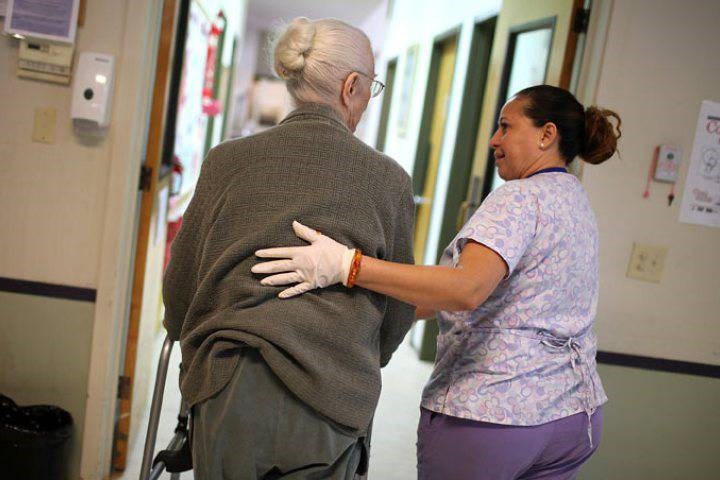A Sudbury woman is adding her voice to a provincial seniors advocacy group that is calling for the reinstatement of tough inspections and prosecutions at long-term care facilities in Ontario after more than 1,600 residents have died following COVID-19 outbreaks.
Kathy Pearsall has been an advocate for seniors rights for 25 years, when she fought and won to have her father removed from a “bad” LTC home in Sudbury. She said she has seen the damage done to residents and their families in many of these facilities with one government after another failing them, refusing to act to protect them, and having little knowledge of, or regard for them.
“It was a real eye opener,” Pearsall said. “People think all homes are the same, but they really aren't.”
More than two decades later, she is now part of the new Seniors for Social Action Ontario (SSAO) group, which was formed in response to the pandemic. The group’s mission over the next few months is to keep the issues of long-term care homes in the spotlight, with the hopes of getting answers as to what went wrong.
“We’re still a very young group, and we're going to be issuing quite a few press releases over the next three months on specific issues we want to see addressed, even beyond the pandemic,” Pearsall said. “There's a lot wrong in the system; it's a broken system.”
According to the Ministry of Long-Term Care, as of June 1, 1,648 residents and seven staff members have died amid outbreaks in the Ontario facilities.
In response to those deaths, SSAO said it wants to see the immediate reinstatement of yearly Resident Quality Inspections (RQIs), which are comprehensive inspections meant to be an objective review of the whole operation of the long-term care home.
The purpose of an RQI is to look at the home’s compliance with the Long Term Care Health Act and the regulation from a broader perspective. Every long-term care home is supposed to receive an RQI annually.
The groups said it appears only nine comprehensive RQIs of homes were done in 2019.
Patricia Spindel, a former president of Concerned Friends of Ontario Citizens in Care Facilities and co-founder of the Advocacy Centre For The Elderly (ACE), said with inspections now only complaint and critical-incident based, residents have no protection — nothing proactive at all to prevent issues like what happened during this pandemic.
“What about residents who have no one visit who could complain on their behalf?” said Spindel. “No wonder we have these high infection and death rates. Successive governments have abandoned their responsibilities to protect residents in these facilities. They had better protections 35 years ago than they do now.”
The group would also like to see the reintroduction of a prosecution policy in conjunction with a Crown attorney cross appointed to the inspection branch by the Deputy Attorney General, as well as the reintroduction of more effective sanctions such as stop intake, fines, charges and licence revocation to ensure compliance with the Act.
“There used to be prosecutions of these facilities, lifting of their licences, imposition of fines, stopping of intakes,” said Dave Cooke, a former cabinet minister in the Rae government and a spokesperson for SSAO.
“Now what we see is repeated compliance orders issued, a reliance on written notices, voluntary correction plans, repeated director’s referrals, and director’s orders, and then it all seems to fall off a cliff and nothing further happens. Licences are not revoked, even with repeated infractions. I want to know why, and so do the people of Ontario, especially those with loved ones in these places.”
The group said it also wants forensic audits to determine why some facilities are short-staffed and do not have adequate linens and other supplies, as well as the mandatory reporting to police by inspectors of any suspicions of criminal activity.
Members also want the Ministry of Health to have the ability to take over facilities under the Health Facilities Special Orders Act if residents face any danger, and to impose non-profit management through municipalities or non-profit seniors agencies instead of for-profit companies, if any commercial home has its licence revoked and is taken over by the ministry.
After SSAO was formed, the group supported a call for an independent public inquiry into the high infection and death rates in Ontario’s long-term care facilities, and said a review, as announced by the Ministry of Health and Long Term Care, would only serve to keep information from the public and protect the interests of the multi-national companies that own many of these homes rather than the interests of the residents that reside in them.a
“We want the inquiry, because it would be chaired by a judge and would be truly independent, whereas, as review would allow the government to decide on the scope of the discussion,” Pearsall said. “I think that justifies a proper inquiry.”
A public inquiry will allow residents, their families, their advocates, and the professionals who work in these homes and their unions to finally publicly reveal the realities of life in these institutions, she said.
“The public needs and deserves to know the details.”
